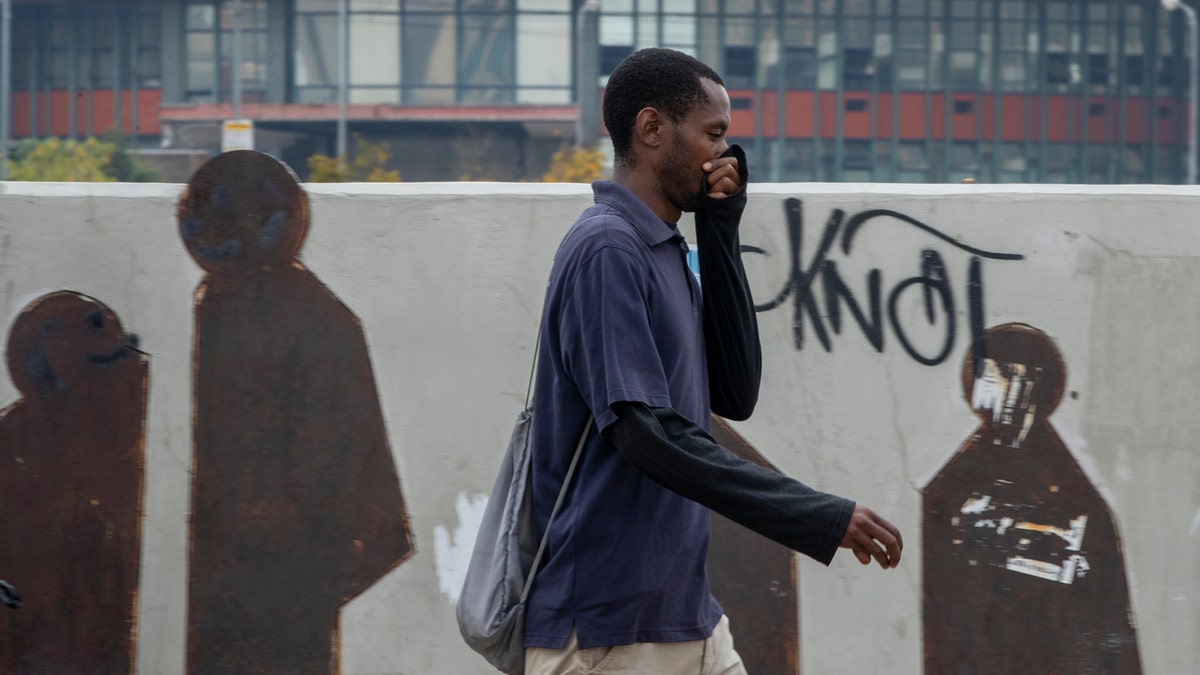Coronavirus global effect: Countries shutter their borders to contain its spread
Economist, former Naval Intelligence Officer John Jordan joins ‘America’s News HQ.’
Johannesburg, SOUTH AFRICA – “You need to get out or you will be stuck”: Tough piece of advice from travel agent Marlene Freiman to U.S. citizens visiting South Africa .
Freiman, who works at Johannesburg's Travel by Arrangement agency, is referring to a COVID-19 virus ban slapped on U.S. citizens visiting their country, which has led to a "panicking" rush to airports to get out before it comes into effect on Wednesday, March 18 — and the erronous belief by some that flights to the U.S. will stop.
The U.S. has been earmarked by the South African government as one of eight countries deemed to be at high-risk from the virus. “No foreign nationals will be allowed from these countries”, said South African transport minister Fikile Mbalula.
WHAT COUNTRIES HAVE NOT DECLARED ANY KNOWN CASES OF CORONAVIRUS?
But South African President Cyril Ramaphosa has caused confusion, observers say.

A man uses his hand to cover his nose as he walks along a downtown street Johannesburg, South Africa, Monday, March 16, 2020. (AP Photo/Themba Hadebe)
Americans, Britons and Chinese travelers particularly have packed the country’s airports, trying to get out. One U.S. traveler who didn’t wish to be named said: ”I was meant to return next week, but I’ve canceled business meetings I came here for and I’m trying to get home before the ban comes in on Wednesday”.
However, Fox News found out that there’s no need, from a government point of view, to leave the country. There is a ban coming into effect on American visitors coming in but – according to Clayson Monyela, head of public diplomacy at the Department of International Relations and Cooperation, the local equivalent of the State Department – “the restriction doesn’t apply to those who are already in the country."
"[The restrictions] mostly affect those who are yet to enter the country, with the intention of containing the spread of the virus,” Monyela said.

South African President Cyril Ramaphosa declared a national state of disaster. Ramaphosa said all schools will be closed for 30 days from Wednesday and he banned all public gatherings of more than 100 people. (AP Photo/Themba Hadebe)
And, for now, South African Airways (SAA), one of two airlines operating direct flights to the U.S., is going to continue flying the Johannesburg–New York City route.
“We continue to operate, and do so mindful of the travel ban, and in support of what the government has referred to as essential travel,” Tlali Tlali, SAA’s spokesperson told Fox News.
Confusion arose on Sunday night, when President Ramaphosa said in a nationwide address that visas for people from countries including the U.S. would be revoked. This contributed to the rush to the airport.

People wearing masks wait for passengers at Johannesburg's O.R. Tambo International Airport, Monday, March 16, 2020 a day after President Cyril Ramaphosa declared a national state of disaster. (AP Photo/Denis Farrell)
But a check of regulations showed that Americans didn’t need a visa to visit South Africa for 90 days. This loophole was closed Monday when the country’s Home Affairs minister Aaron Motsoaledi told reporters “we will start asking for visas”. The confusion deepened as the president has already said no visas would be issued.
Meanwhile, in its advice to travelers to South Africa, the U.S. State Department is still stating now on its website that American citizens can travel here without visas.
In the opposite direction, a hold on applications has been introduced at the American Embassy in South Africa for non-immigrant visas until May 31.
South African officials have also deployed a special team to prevent Americans and travelers from other high-risk countries from trying to enter South Africa by taking a flight to a low-risk country, and then routing.
CORONAVIRUS: WHAT YOU NEED TO KNOW
Airlines often only release passenger lists as the door to the departing aircraft is closed. But the team from the South African Advanced Passenger Process puts the long flight time from most points of departure to good use.

Train commuters hold on to the side of an overcrowded passenger train in Soweto, South Africa, Monday, March 16, 2020. (AP Photo/Themba Hadebe)
Since the weekend, every single international passenger’s real travel itinerary is investigated, and if necessary, on arrival the person will be turned around, claimed Minister Motsoaledi, adding that the investigators can find out “so and so mustn’t come”.
Local medical observers have praised President Ramaphosa’s lockdown. Only 62 cases of the virus have been reported, with 52 of these coming from travelers who arrived recently on international flights. No-one has died of the virus in South Africa yet.
Travel restrictions are being introduced in other African countries too. Egypt has announced it’s stopping all air traffic from its airports from Thursday to the end of the month. Somalia has banned entry for coronavirus-hit countries such as the U.S. This effectively stops members of the U.S.’s large Somali population in cities like Minnesota from visiting families back home.
CLICK HERE FOR THE FOX NEWS APP
Morocco, Algeri, and Liberia have also introduced differing bans on international flights.
Perhaps the most unusual ban in Africa though is that at Kenya’s Ol Pejeta conservancy. Today the game reserve announced that visits to their chimpanzees’ compound have been stopped. Their website explains: “Great apes are so closely related to humans that we will not take any chances of them being infected with the virus. “
Paul Tilsley is a freelance correspondent for Fox News Channel and foxnews.com, covering the African continent. Follow him on twitter @paultilsley1







































